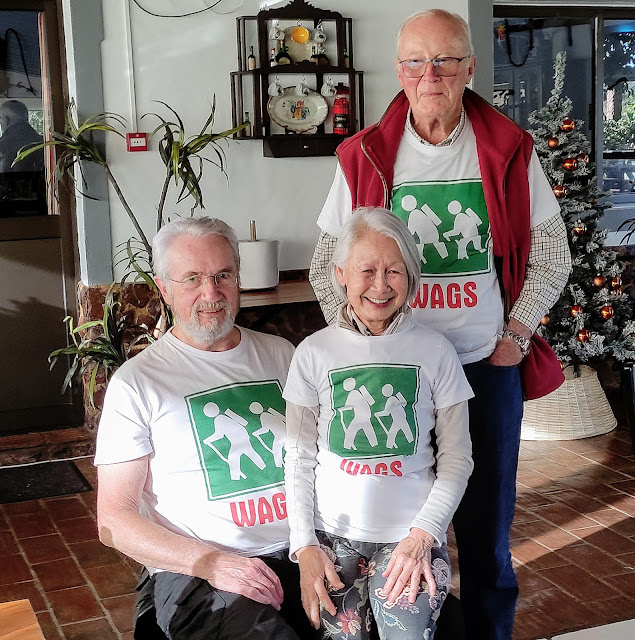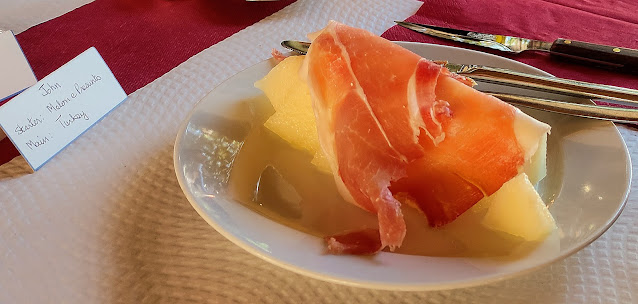Silves Double Whammy
Last week we gave you a Double Bubble. This week, we have a Double Whammy, so to speak. First up is the Christmas Lunch organised so well by Hazel; then there is the Silves Bubble´s Walk, taking place once again on a Thursday.
Act One: Behind the Castle
“On Tuesday 15th December, 9 WAGS gathered for the Christmas lunch at Recanto dos Mouros, the restaurant at the back of Silves castle also known to some but not all as The Benches, They were Maria, Myriam, Paul, Andrew, Lindsey, Rod, Susan, JohnH and me. We had the private dining room all to ourselves!
Two tables were set: One for the four men and one for the five ladies. The day was dry and it was warmer than it had been at the weekend. The atmosphere was fun and friendly. We were thankful that we could meet and enjoy catching up with each other. The food was delicious, the service attentive, and cost very reasonable.
We remembered to drink to the health of Absent WAGS ! And now a seasonal poem.
If you look for Me at Christmas
you won´t need a special star -
I´m no longer just in Bethlehem,
I´m right there where you are.
You may not be aware of Me
amid the celebrations -
You´ll have to look beyond the stores
and all the decorations.
But if you take just a moment
from your list of things to do
And listen to your heart, you´ll find
I´m waiting there for you.
You´re the one I want to be with,
You´re the reason that I came,
And you´ll find Me in the stillness
as I´m whispering your name.
Love, Jesus.
Hazel ”
Early arrivals helped Hazel decorate the tables and Starter photos were taken, two WAGS missing, for reasons explained later.
 |
| Com mascara |
 |
| e sem mascara |
The segregated table arrangement which had worked so well the previous week for the encounter between the Lagobrigenses and the Silvenses at O Cangalho worked equally well for this three-cornered encounter with two Padernenses joining the other two groups.
Only three were wearing team colours.
Paul announced at the start that the men´s table would talk about nothing but women and sex, not necessarily in that order, but in fact the only time after that that word "sex" was heard. it came from the ladies´ table; the men were remarkably restrained in their behaviour. Indeed, after Hazel had said Grace, Andrew and JohnH could be heard agreeing that the short Latin Grace “Benedictus Benedicat”, as used at their respective schools, was up there with the best, although Andrew favoured a slightly longer version, perhaps “Benedictus Benedicat per Jesum Christum Dominum Nostrum Amen” is the one he had in mind.
Paul tried to lower the tone of the conversation, as he so often tries to do, by saying that his favourite Grace is:-
Through the teeth and round the gums
Watch out stomach - here it comes!
(User Warning: That´s your poetry ration for the week all used up!)
but the men´s discourse soon returned to consideration of more serious topics, such as credit card theft and residençia renewals. What the ladies talked about has not been divulged but clearly it could not have been too serious.
The customary gourmet pictures were taken.
There was bacalhau somewhere, but it seems to have escaped the photographer´s eagle eye.
 |
| "I am not a cake person" |
Andrew had to leave early for a meeting, but that didn´t seem to phase Lindsey as she relaxed after the meal.
and we concluded with a Finisher´s photo, eight out of the nine diners.
Now we await Rod´s report on the Silves Bubble walk on Thursday 17th December for Act Two Herdade de Parra.
Ah! here it is.
Thankyou John, and especially Hazel, for faultless organisation and going the extra kilometer by providing the decs and the Mince Pies. In fact the decorative Christmas trees were a big hit with Myriam, so much so that we have 2 of them decorating our dining table, although they are luxury ones being created from Tomorrow magazine rather than the economy Lidl handout.
The sum total of our Crimble decs - 2 modest poinsietta and 2 luxury Christmas trees.
I feel rather guilty about the Lagos Bubble not featuring a walk, (nor even a virtual account) although we did go out for a wander round on Thursday to visit the Loja das Animais where friendly owner Joao Noel (there's the Christmas link) helped us out with my rather sick and miserable female Zebra finch, Bianca. he ended up giving her a tiny pill (to us) but old-fashioned gob-stopper size to her, using a special push pipe to open her beak and deposit the pill in the back of her throat. The operation looked quite brutal as he squeezed her fragile head in his horny finger and thumb, but she came through fairly unscathed, and seems to be somewhat recovered now after 3 doses.
Anyway I feel I must add some information for when we look back on these halcyon days of lockdown, and solitary confinement, so I have unearthed a treatise on the name of virus from the pages of The Oldie, which goes in to the Latin derivation No doubt Terry will be over the moon to read about this! (sorry Tel- it`s only padding!)
The Romans would have recognised the word, and associated it with kings and snakes.
What is the origin of the word coronavirus? With grim certainty, it's bound to be the word of the year.
It's a hybrid word from the Latin corona, meaning crown, and the Latin virus, originally meaning a poisonous secretion from snakes - ie a kind of venom. Scientists gave the virus the name because those knobbly bits on the surface of the virus are like the crests and balls of a crown.
In Latin, corona originally meant a wreath of flowers, sometimes of precious metals (the Oxford Latin Dictionary is my source). You see these delicate golden wreaths of flowers across the ancient world, in Greece and Rome. The Latin corona is derived from the Greek, corone.
In time, the word corona was lent to all crowns, whether floral or not. Crowns - or coronae - were worn in the ancient world by kings and were also placed on statues of the gods as offerings. In a mocking way, coronae were put on slaves' heads, too, when they went up for auction. They were even worn as a cure for headaches.
Virus, too, is originally derived from the Greek, ios. As well as meaning a poisonous secretion by snakes, it was also used in Latin to mean a poisonous emanation from a plant, a poisonous fluid, a nasty manner of speech or disposition, an acrid juice or a magic potion.
Used together, though, the words corona and virus have only one miserable meaning these days.












































Allegedly, from one who was there, Nelson's last words were: "Kiss me hardy!" to which the response was -allegedly again- "Sir, I would if I could find it..."
ReplyDeleteSo much for historical accuracy as seen through Napoleonic eyes...
Maybe his actual last words were `Thank God I have done my duty!`, but there is also a story that it was `Kismet, Hardy` as he had just heard they had won the victory!! My theory was that he said ~Kiss Emma for me Hardy, as he was a generous soul!!
Delete